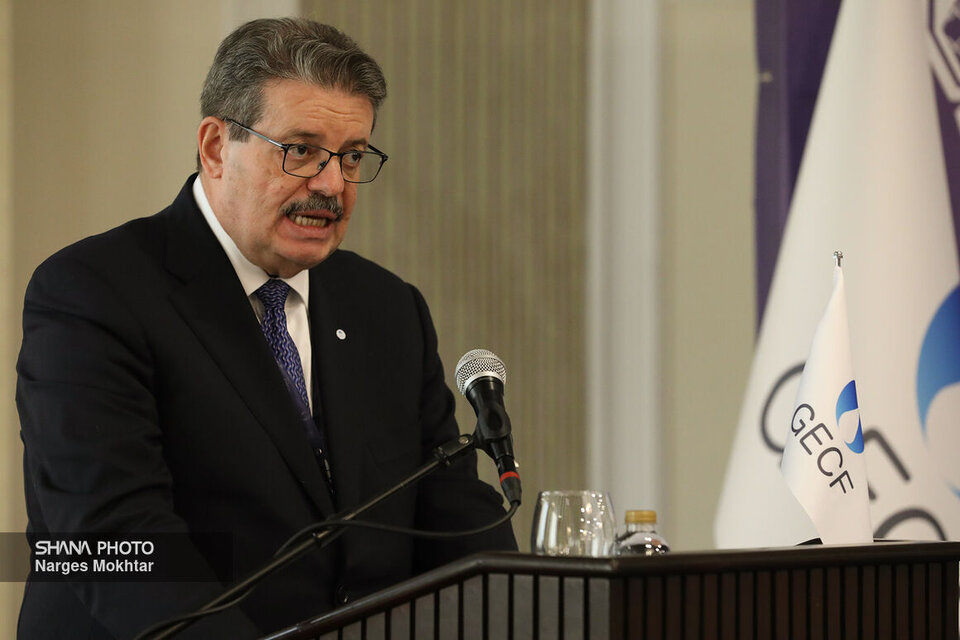He stated that cumulative investments required in the upstream and midstream sectors to meet growing gas demand and ensure natural gas supply security are projected to exceed $9 trillion.
Speaking on Saturday at the Expert Workshop of the GECF Secretariat, held on the sidelines of the 26th Ministerial Meeting in Tehran, Hamel expressed his condolences on behalf of GECF to the Minister of Petroleum of the Islamic Republic of Iran, Mohsen Paknejad, for the loss of his brother.
Hamel highlighted Iran’s historical significance in shaping the energy sector, noting that Iran, as one of the world's oldest oil producers, began its energy journey with the discovery of oil in Masjed Soleiman in 1908, marking the first oil well in the Middle East.
He also pointed out Iran's groundbreaking move in 1951 to nationalize its oil industry, setting a global precedent for resource sovereignty. This step, he said, paved the way for the United Nations General Assembly's adoption of a key resolution on permanent sovereignty over natural resources in 1962.
Iran's pivotal role extended with its co-founding of OPEC in 1960, a major initiative that empowered oil-exporting nations to collectively shape global markets. Later, in 2001, Iran played a crucial role in establishing the GECF in Tehran, a contribution further developed under the leadership of former Secretary General Mohammad-Hossein Adeli and a diligent Iranian team.
Iran’s resilience amid challenges
Hamel praised Iran’s resilience in overcoming numerous challenges, including unilateral coercive measures, describing its strength as admirable. He noted that Iran’s abundant resources, technological expertise, and forward-thinking vision position the country as a cornerstone of progress in the global oil and gas markets.
GECF, with 20 member countries spanning four continents, represents 70% of the world’s natural gas reserves and 40% of marketed production. He highlighted the presence of technical department heads at the workshop, who shared their latest findings and publications, including the Annual Gas Market Report (AGMR), Global Gas Outlook 2050 (GGO), Annual Statistical Bulletin (ASB), and Data Exchange Mechanism (DEC).
Energy’s role in development
“Energy has always been the cornerstone of economic development,” Hamel remarked, adding that access to affordable and reliable energy has driven human progress throughout history. Beyond economics, he stressed energy’s fundamental role in human empowerment, well-being, and access to essential services.
Hamel affirmed GECF’s position on energy transition, stressing that sustainable development requires leveraging all energy sources and technologies, tailored to national priorities. He argued against a one-size-fits-all solution, highlighting the importance of equitable and affordable transitions.
He pointed out that switching from traditional biomass to LPG for 2.1 billion people without clean cooking access would bring significant health, environmental, and economic benefits. Meanwhile, wealthier nations could explore transitioning to cleaner fuels like hydrogen, provided it remains economically feasible.
Natural gas’s role in a growing energy demand
Hamel projected a 20% increase in global energy demand over the next three decades, driven by population growth, urbanization, economic expansion, and rising living standards. He emphasized that hydrocarbons will remain a vital part of the energy mix, though their share will decline from 80% today to 63% by 2050. Natural gas, as the cleanest hydrocarbon, will see a 34% increase in demand by 2050, rising from 23% to 26% of the global energy mix.
He highlighted natural gas’s role in reducing urban pollution, enhancing energy efficiency, and supporting food security through its use in fertilizer production. Additionally, natural gas complements renewables by providing stability when renewable sources are insufficient.
Supply and demand security
Hamel reiterated that supply and demand security are interconnected. Ensuring supply security necessitates timely and adequate investment, while demand security requires a stable policy environment and predictable long-term demand. Together, these factors enable effective planning, market access, infrastructure protection, and financial stability.
Role of technology
The Secretary General underscored the critical role of technology in enhancing the security, affordability, and sustainability of natural gas. Advanced technologies such as hydraulic fracturing, LNG transport, carbon capture, and satellite monitoring reduce emissions, ensure supply stability, and enhance operational efficiency. He also emphasized the potential of AI in optimizing natural gas operations.
Expanding technological cooperation
Hamel highlighted the GECF’s commitment to technological collaboration among its members. He cited the establishment of the Gas Research Institute (GRI) in Algiers as a platform for joint research and knowledge exchange. Recalling his recent visit to Iran’s Research Institute of Petroleum Industry, he expressed admiration for its capabilities and affirmed ambitions to develop specialized technology clusters within the GRI.
In closing, Hamel reiterated GECF’s dedication to fostering sustainable energy development and expressed hope for successful collaboration in the coming years.


Your Comment